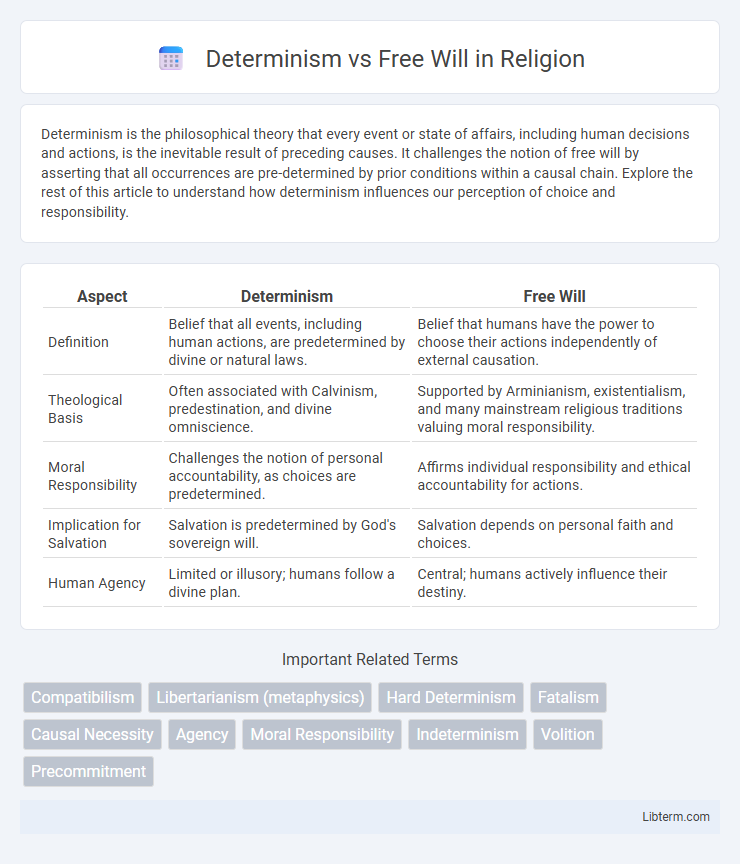Determinism is the philosophical theory that every event or state of affairs, including human decisions and actions, is the inevitable result of preceding causes. It challenges the notion of free will by asserting that all occurrences are pre-determined by prior conditions within a causal chain. Explore the rest of this article to understand how determinism influences our perception of choice and responsibility.
Table of Comparison
| Aspect | Determinism | Free Will |
|---|---|---|
| Definition | Belief that all events, including human actions, are predetermined by divine or natural laws. | Belief that humans have the power to choose their actions independently of external causation. |
| Theological Basis | Often associated with Calvinism, predestination, and divine omniscience. | Supported by Arminianism, existentialism, and many mainstream religious traditions valuing moral responsibility. |
| Moral Responsibility | Challenges the notion of personal accountability, as choices are predetermined. | Affirms individual responsibility and ethical accountability for actions. |
| Implication for Salvation | Salvation is predetermined by God's sovereign will. | Salvation depends on personal faith and choices. |
| Human Agency | Limited or illusory; humans follow a divine plan. | Central; humans actively influence their destiny. |
Introduction to Determinism and Free Will
Determinism posits that all events and choices are dictated by preceding causes, leaving no room for randomness or alternative possibilities. Free will asserts that individuals possess the capacity to make independent choices unconstrained by prior events or natural laws. The debate between determinism and free will centers on reconciling causal necessity with human autonomy.
Historical Perspectives on Human Agency
Historical perspectives on human agency reveal deep philosophical debates between determinism and free will, tracing back to ancient Greek philosophers like Aristotle, who emphasized voluntary action, and the Stoics, who advocated for a deterministic cosmos. During the Enlightenment, thinkers such as Immanuel Kant proposed a synthesis, arguing for autonomy within a deterministic framework, influencing subsequent discussions on moral responsibility. Modern debates integrate neuroscience and psychology, challenging traditional notions of free will by highlighting unconscious determinants of behavior while still recognizing some degree of personal agency.
Key Philosophical Arguments for Determinism
Determinism asserts that every event, including human actions, is causally determined by preceding events and natural laws, leaving no genuine free will. Key philosophical arguments include the principle of causality, which posits that all effects have specific causes, and the predictability of physical phenomena, suggesting behavior follows deterministic patterns. Neurobiological research supports determinism by showing that brain activity precedes conscious decision-making, implying choices are products of prior neural states rather than autonomous will.
Major Theories Supporting Free Will
Major theories supporting free will include libertarianism, which argues that individuals have genuine control over their actions independent of causal determinism. Agent causation theory posits that agents themselves can initiate new causal chains, allowing for autonomous decision-making. Compatibilism reconciles free will with determinism by redefining freedom as acting according to one's desires and reasons without external coercion.
Scientific Insights: Neuroscience and Human Choice
Neuroscientific research reveals that brain activity predicting decisions occurs milliseconds before conscious awareness, challenging traditional notions of free will and supporting determinism. Functional MRI studies identify neural correlates tied to decision-making processes in the prefrontal cortex, emphasizing the brain's role in shaping choices. These findings suggest human choice may result from deterministic neurobiological mechanisms rather than independent conscious control.
Compatibilism: Bridging Determinism and Free Will
Compatibilism asserts that free will and determinism are not mutually exclusive, positing that individuals can make meaningful choices even within a causally determined universe. This philosophical stance emphasizes that freedom is defined by the ability to act according to one's desires and rational intentions, without external coercion. By reconciling deterministic causality with personal agency, compatibilism provides a coherent framework that acknowledges both the influence of prior causes and the legitimacy of autonomous decision-making.
Moral Responsibility and Ethical Implications
Determinism challenges the concept of moral responsibility by suggesting that all actions are predetermined by prior causes, which may undermine accountability in ethical judgments. Free will supports the idea that individuals can make autonomous choices, thereby justifying praise or blame based on intentional behavior. The debate influences legal systems and moral philosophy, impacting how society assigns guilt, punishment, and concepts of justice.
Religious and Cultural Views on Free Will
Religious perspectives on free will vary significantly, with many Christian denominations emphasizing human responsibility and moral choice as gifts from God, while Islamic theology often balances divine predestination (Qadar) with human accountability. Hinduism and Buddhism incorporate karma and dharma, reflecting a cyclical understanding where free will interacts with cosmic law and past actions. Cultural views also diverge, with Western societies typically promoting individual autonomy in free will, contrasting with Eastern collectivist traditions that highlight harmony and duty over personal freedom.
Determinism and Free Will in Everyday Life
Determinism posits that every event, including human actions, is causally determined by preceding events and natural laws, limiting true freedom of choice. In everyday life, this perspective suggests that decisions and behaviors are the inevitable outcomes of genetic, environmental, and psychological factors. Contrastingly, the experience of free will emerges through conscious deliberation and moral responsibility, highlighting the tension between determinism's causality and human autonomy.
Conclusion: The Ongoing Debate
The debate between determinism and free will remains unresolved, with compelling arguments supporting both the idea that all events are causally determined and the belief in human autonomy. Neuroscientific findings suggest that unconscious brain processes influence decisions, yet subjective experience and moral responsibility emphasize the perception of choice. Ongoing interdisciplinary research continues to explore how these perspectives interact, highlighting the complexity of human agency.
Determinism Infographic

 libterm.com
libterm.com